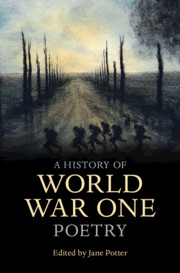Book contents
- A History of World War One Poetry
- A History of World War One Poetry
- Copyright page
- Dedication
- Contents
- Illustrations
- Contributors
- Acknowledgements
- Introduction
- Part I Literary Contexts
- Part II Nations and Voices
- Chapter 6 Germany and Austria-Hungary
- Chapter 7 Czech War Poetry
- Chapter 8 France
- Chapter 9 Belgium
- Chapter 10 Great Britain
- Chapter 11 Ireland
- Chapter 12 Russia
- Chapter 13 Serbia
- Chapter 14 The United States
- Chapter 15 Italy
- Chapter 16 South Africa
- Chapter 17 Australia and New Zealand
- Chapter 18 Canada
- Chapter 19 South Asian Poetry
- Part III Poets
- Part IV
- Bibliography
- Index
Chapter 6 - Germany and Austria-Hungary
from Part II - Nations and Voices
Published online by Cambridge University Press: 18 January 2023
- A History of World War One Poetry
- A History of World War One Poetry
- Copyright page
- Dedication
- Contents
- Illustrations
- Contributors
- Acknowledgements
- Introduction
- Part I Literary Contexts
- Part II Nations and Voices
- Chapter 6 Germany and Austria-Hungary
- Chapter 7 Czech War Poetry
- Chapter 8 France
- Chapter 9 Belgium
- Chapter 10 Great Britain
- Chapter 11 Ireland
- Chapter 12 Russia
- Chapter 13 Serbia
- Chapter 14 The United States
- Chapter 15 Italy
- Chapter 16 South Africa
- Chapter 17 Australia and New Zealand
- Chapter 18 Canada
- Chapter 19 South Asian Poetry
- Part III Poets
- Part IV
- Bibliography
- Index
Summary
In Germany the years of the First World War saw an overwhelming outpouring of verse, fired for the most part by intense patriotic enthusiasm around 1914. The lyric form provided both an immediate outlet for ordinary Germans to record their experiences and feelings, but also ready-made traditional models to shape those experiences. Alongside chauvinistic hymns by poets who remain, to all intents and purposes, ‘lost voices’, were soldier-poets, writing from the front – some of them prolific and enormously popular at the time, yet now almost completely forgotten, others still read today. But there were also worker poets, other critical voices, expressly anti-war poets and women poets who focused often on the victims left behind. Later too came the satiricalor epic voices. German poetry of the period is inevitably mixed up also with Expressionism, which made for a more radical formal experimentation than in many other national literatures at the time.
- Type
- Chapter
- Information
- A History of World War One Poetry , pp. 99 - 117Publisher: Cambridge University PressPrint publication year: 2023

